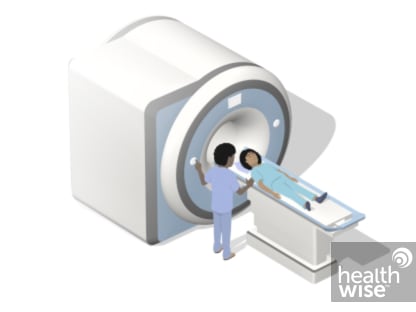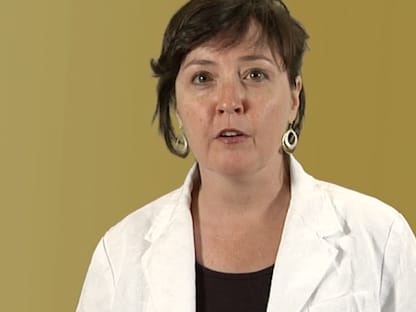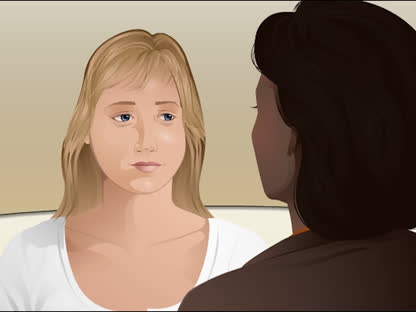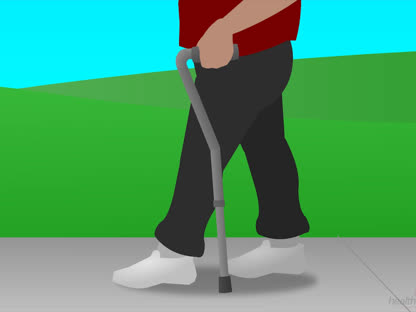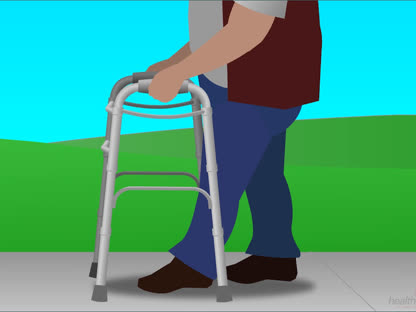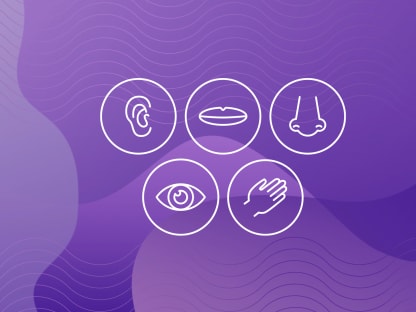Multiple Sclerosis (MS)
Condition Basics
What is multiple sclerosis (MS)?
Multiple sclerosis (MS) is a disease that affects the central nervous system—the brain and spinal cord. It also affects the nerves to the eyes. It can cause problems with muscle strength, vision, balance, mood, sensation, and thinking.
Your nerve cells have a protective covering called myelin. Without myelin, the brain and spinal cord can't communicate with the nerves in the rest of the body. MS causes areas in the brain and spinal cord to get inflamed. It slowly damages the myelin and nerves in patches. These patches of damage are called lesions.
MS tends to get worse over time. But usually this happens slowly. It's hard to predict how MS will affect you. MS is different for each person. Some people's lives won't change much with MS. Those people may function well for a long time. But others may lose the ability to walk or do everyday tasks as the disease gets worse.
There is no cure for MS. But medicines and other treatments might help slow its progression and treat your symptoms.
What causes it?
The exact cause isn't known, but most experts think that MS is an autoimmune disease. In MS, the immune system attacks the protective covering of the nerve cells (myelin) in parts of the brain and spinal cord. Areas of the brain and spinal cord get inflamed. Over time, the myelin and nerves are damaged.
What are the symptoms?
MS symptoms vary from person to person. They may come and go over time. MS can cause problems with muscle strength, vision, balance, mood, and thinking. It may cause fatigue, pain, muscle spasms, and numbness and tingling. It may also cause bowel and bladder problems. As MS progresses, symptoms may get worse.
How is it diagnosed?
Your doctor will ask questions about your symptoms and health and do a neurological exam. This exam checks your muscle strength and how well your nerves are working. You'll probably have an MRI to look for lesions in your brain. And you may have a spinal tap (lumbar puncture) if needed.
How is MS treated?
Different medicines are used to treat MS. Some may slow its progression and help prevent attacks (relapses). Some treat attacks. Others help treat the symptoms. Other treatments may include physical, occupational, speech, or cognitive therapy to help you function better. Counseling and exercise may also help.
What Increases Your Risk
Experts don't know why MS happens to some people but not others. The disease runs in families, so there may be a genetic link. MS is more common in people who grew up in regions that are farther away from the equator. Low vitamin D levels may also be linked to MS. Certain infections and smoking may also play a role in MS.
Symptoms
The symptoms of MS vary from person to person. Which symptoms you have will depend on which parts of your brain or spinal cord are damaged. Over time, symptoms may come and go, or they may be long-lasting. Certain things like being hot or having an infection may cause symptoms to get worse for a short time. As MS progresses, symptoms may get worse.
Common symptoms
- Feeling very tired (fatigue).
- Muscle symptoms. These include weakness, stiffness, and spasms. You may be clumsy or have a tremor. These problems may make it hard to hold on to things or walk. Over time, a cane or wheelchair may be needed.
- Visual symptoms. These include blurry vision, eye pain, blindness, and double vision. Optic neuritis—a sudden loss of vision that's often painful—may be a first symptom of MS.
- Sensory symptoms. These include numbness and tingling, feelings of pins-and-needles, and coldness. They may occur in a limb or on your face or body. You may also feel a band of tightness around the trunk of your body.
- Pain. This may include headaches, nerve pain, and pain from muscle spasms.
- Bladder symptoms. These may include a need to urinate often. Or you may not be able to control or empty your bladder. You may wake up at night to urinate.
- Constipation and other bowel symptoms. You may have a hard time passing stool (constipation). Or you may lose control of your bowels.
- Sexual problems. You may be less interested in having sex. Or you may have pain during sex or have problems getting an erection.
- Cognitive problems. You may have trouble focusing. You may forget things. Or you may have trouble thinking quickly or solving problems.
- Mental health symptoms. You may feel depressed or anxious.
- Sleep problems.
- Vertigo and balance problems. You may feel dizzy or unsteady.
What Happens
The course of MS depends on which type you have. Most people who have MS have attacks over many years. An attack is a period of time when there are new symptoms or when old symptoms get worse. An attack can last for days to weeks. Symptoms usually go away (remit) after an attack. Attacks are also called relapses, flares, or exacerbations.
In general, MS follows one of four courses:
- Relapsing-remitting. Attacks come and go over time. The disease doesn't get worse between attacks.
- Secondary progressive. The disease follows a relapsing-remitting course at first. Then it gets worse (progresses) over time, even without attacks.
- Primary progressive. The disease gets worse from the start, with or without attacks.
- Clinically isolated syndrome (CIS). This is an MS attack in a person not known to have MS. An MRI only shows damage from this attack. There are not old MS lesions on the MRI. These people may or may not go on to have MS.
It's hard to predict how MS will affect you. Some people may function well for a long time. But others may lose the ability to walk or do everyday tasks as the disease gets worse.
Problems caused by MS
MS can cause cognitive problems. These may include trouble with:
- Memory, especially short-term memory.
- Problem solving.
- Keeping attention on a mental task.
- Finding the right words to express yourself.
- Grasping ideas quickly.
These problems can occur early in the course of the disease. And they may get worse with time. These problems can also be a side effect of medicines you're taking for other MS symptoms. Or they could be made worse by other symptoms of MS, like depression, fatigue, pain, and sleep problems.
MS can also cause mental health problems. Someone who has MS may:
- Have depression.
- Have thoughts of suicide.
- Have anxiety.
- Feel sad, worried, or angry.
- Feel lonely or be isolated.
- Laugh or cry suddenly for no reason, even if something isn't funny or sad.
Medicines and counseling can help treat problems caused by MS. Joining a support group for people with MS can also be an option. Talk to your doctor if you need help.
People with MS are more likely to die by suicide. Emergency help is available 24 hours a day, 7 days a week. If you or someone you know talks about suicide, self-harm, a mental-health crisis, a substance-use crisis, or any other kind of emotional distress, get help right away. You can:
- Call the Suicide and Crisis Lifeline at 988.
- Call 1-800-273-TALK (1-800-273-8255).
- Text HOME to 741741 to access the Crisis Text Line.
Consider saving these numbers in your phone.
Go to 988lifeline.org for more information or to chat online.
Learn more
When to Call a Doctor
Call 911 or other emergency services immediately if you have one or more of the following signs of a stroke. Symptoms of a stroke happen quickly. A stroke may cause:
- Sudden numbness, tingling, or weakness or loss of movement in your face, arm, or leg, especially on only one side of your body.
- Sudden vision changes.
- Sudden trouble speaking.
- Sudden confusion or trouble understanding simple statements.
- Sudden problems with walking or balance.
- A sudden, severe headache that is different from past headaches.
Call your doctor if you have more than one symptom of MS, such as:
- Being unable to hold urine or to completely empty the bladder.
- Stiff, mechanical movements (spasticity) or uncontrollable shaking (tremors).
- Dizziness and unsteadiness.
- Problems with memory, attention span, finding the right words for what you mean, and daily problem-solving.
- Constipation and other bowel disorders.
- Tingling; numbness; tightness in a band around the trunk, arms, or legs; or electric shock sensations moving down the back, arms, or legs.
- Feeling sad or hopeless, or not enjoying things like you once did. You may be depressed.
If you have been diagnosed with MS, call your doctor if:
- If you think you are having an attack (relapse).
- You have new or worse symptoms.
Exams and Tests
It isn't always easy to diagnose MS. The first symptoms may be vague. And many of the symptoms can be caused by problems other than MS.
Your doctor will use several pieces of information to diagnose MS. Your doctor will:
- Ask questions about your symptoms—past and present—and your past health.
- Do a neurological exam. This exam checks your strength and how well your nerves are working.
-
Do tests.
- You'll probably have an MRI to look for lesions in your brain. If lesions are seen, it may mean that you have MS. But having lesions doesn't always mean that you have MS. There could be other causes.
- You may have a spinal tap (lumbar puncture).
- You may have special nerve tests, such as an evoked potentials test.
- Blood tests may be done to see if something else is causing your symptoms.
It may take time before your doctor can confirm that you have MS. Your doctor may need to see how your symptoms, physical exam, and MRI results change over time.
Learn more
Watch
Treatment Overview
Your treatment will depend on what type of MS you have, your choices about medicines, and your symptoms. There is no cure for MS. But there are medicines and other treatments that might help.
Different medicines are used to treat MS. Some treat attacks (relapses). Others help prevent attacks and reduce brain lesions. They may slow the progression of the disease. Other medicines may be used to manage ongoing symptoms.
Physical therapy, occupational therapy, and speech therapy can help you manage some physical problems caused by MS. Cognitive therapy can help if you have trouble thinking clearly or remembering.
Regular exercise and physical activity can also help. They can reduce symptoms, and exercise might reduce MS attacks. Exercise is helpful for everyone who has MS, even if you have severe symptoms or can't do certain things. A physical therapist can help you find the best way for you to be active.
If you have diabetes, high blood pressure, or heart problems, managing these may help your MS.
Depression and anxiety are common with MS. If you have either of these, talk to your doctor. Medicines and counseling can help.
Some complementary medicine treatments may help relieve symptoms of MS. Talk to your doctor if you are interested in trying any of these treatments.
In some cases, surgery may be done if you have severe tremor (shakiness) that affects movement. Or it may be done to implant a catheter or pump in the lower spinal area to deliver a constant flow of medicine to help treat severe muscle stiffness (spasticity).
Learn more
Watch
Self-Care
General care
- Be safe with medicines. Take your medicines exactly as prescribed. Call your doctor if you think you are having a problem with your medicine.
- Use a cane, walker, or scooter if your doctor suggests it.
- Keep doing your normal activities as much as you can.
- Try to stay active mentally. Read or do things like crossword puzzles if you enjoy doing them.
- Keep cool. For many people, MS symptoms get worse when they are even a little bit hotter. This could be from the weather, a hot shower, exercise, or a fever. Cooling vests, neck wraps, cool cloths, air conditioning and cool showers after exercise can help. So can avoiding hot tubs and saunas.
- Seek connections. Spend time with friends, family, and others. Joining a support group for people with MS may help.
- Tell your doctor if you feel sad, depressed, or hopeless. Also tell your doctor if you have lost interest in things you usually enjoy. Medicine and counseling can help.
- If you smoke, try to quit. Smoking may increase problems caused by MS. If you need help quitting, talk to your doctor about stop-smoking programs and medicines. These can increase your chances of quitting for good.
- Try to cut down on stress. Calm yourself or release tension by doing an activity you enjoy, such as reading a book, listening to music, or gardening.
Diet and exercise
- Talk to your doctor about your diet and any supplements you take.
- Tell your doctor if you're having problems chewing or swallowing. Your doctor or a speech therapist may recommend changes to your diet to help make it easier to swallow. You may need to avoid certain foods or liquids. You also may need to change the thickness of foods or liquids in your diet.
- If you get full quickly or get tired easily when you eat, try eating smaller meals more often. You can also try a liquid meal replacement such as Ensure or Boost.
- Get exercise and physical activity on most days. Exercise can be safe even if your symptoms are severe. A physical therapist can help you find the best way to be active. Physical activity and exercise can reduce many of the symptoms of MS. Exercise might also reduce attacks (relapses).
- Ask your doctor about taking vitamin D. The doctor may suggest taking it and can suggest a dose. Low vitamin D levels may be linked to MS.
Learn more
Watch
Medicines
There are different types of medicines used to treat MS.
Disease-modifying drugs (DMDs) may:
- Prevent attacks (relapses).
- Reduce new lesions in the brain and spinal cord.
- Reduce or slow down the progression of MS.
DMDs may be:
- Injected into a vein (infused) once a month, a few times a year, or yearly.
- Taken as a pill 1 or 2 times a day.
- Given to yourself as a shot 1 to 3 times a week.
Damage to the nervous system may occur early in the disease, even while symptoms are still mild. Early treatment with DMDs may help prevent or delay some of this damage.
Talk to your doctor about what DMD is right for you. You and your doctor may consider:
- The type of your MS.
- Your concerns about risks and side effects.
- How well the medicine works.
- The cost of the medicine.
- How you prefer to take the medicine (shot, pill, or an IV infusion).
- If you have attacks or new lesions seen on an MRI.
- Whether you plan to get pregnant, can become pregnant, can get someone pregnant, or are breastfeeding.
Medicines to treat an attack may:
- Help you recover faster from an attack.
Medicines that treat ongoing symptoms may:
- Help with symptoms, such as depression, nerve pain, fatigue, and bladder problems.
Complementary and Alternative Treatments
Many complementary and alternative medicine (CAM) treatments have been proposed for people who have MS. Research hasn't shown all of the proposed CAM treatments to be effective or safe for people who have MS. But some treatments may help relieve certain symptoms of MS. For example, some forms of marijuana may help with muscle stiffness (spasticity) and pain.footnote 1
A person with MS may benefit from safe CAM treatments along with standard medical treatment. For example, some people use acupuncture, massage therapy, mindfulness, or yoga to help with some of their symptoms.
Talk to your doctor if you're interested in trying any of these treatments.
Learn more
Watch
Related Information
References
Citations
Credits
Current as of: October 2, 2025
Author: Ignite Healthwise, LLC Staff
Clinical Review Board
All Ignite Healthwise, LLC education is reviewed by a team that includes physicians, nurses, advanced practitioners, registered dieticians, and other healthcare professionals.
Current as of: October 2, 2025
Author: Ignite Healthwise, LLC Staff
Clinical Review Board
All Ignite Healthwise, LLC education is reviewed by a team that includes physicians, nurses, advanced practitioners, registered dieticians, and other healthcare professionals.

